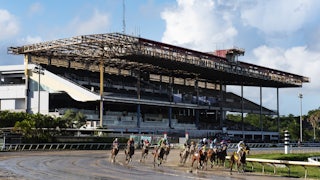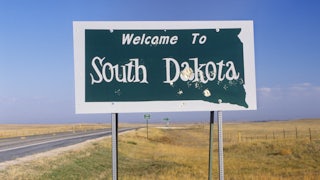The Puerto Rico Status Act introduced last week in the House of Representatives is the latest in a long line of efforts to address the legislation’s namesake issue. It would allow Puerto Ricans to choose between statehood, independence, and free association; for the first time ever, that vote would exclude the status quo and bind Congress to the result. Therefore, it’s the most serious attempt in decades to decolonize the largest and longest-held U.S. possession.
It’s also a politically stillborn effort that has no chance of becoming law.
The bill may pass the House, but it will surely die in the Senate, where vociferous and near-unanimous Republican opposition to the mere possibility of Puerto Rican statehood makes it a nonstarter. On the other side of the aisle, support for statehood is far from unanimous, and Senate Democrats who have been unwilling to eliminate the filibuster for their legislative priorities surely won’t do so for an issue that’s not even on their radar.
When the bill fails, whatever little attention the issue is likely to garner over the next few weeks will fade, until the next well-meaning effort runs into the same brick wall of political reality. And Puerto Rico will remain what it has been for 124 years: a U.S. colony.
In recent months, congressional leaders rightfully denounced this as an unacceptable state of affairs.
“Let me tell you what this bill is about,” said Maryland Representative Steny Hoyer when he first unveiled a draft of the Puerto Rico Status Act in May. “Does the United States want to be a colonial power? I hope the answer to that is ‘no.’ Emphatic no. That is not a political issue. That is a principle issue. That’s an issue of what our country is about.”
If he meant it, and if we know the current attempt is doomed to fail, we should waste little time on this legislation and instead look past it to consider what a politically viable decolonization process would look like.
There are two main barriers to addressing the issue of Puerto Rico’s status. The first is that Puerto Ricans remain starkly divided, which has prevented the sort of consensus that might seem to Congress like an unignorable mandate. The 2020 Puerto Rican status referendum, which simply asked “Yes” or “No” on statehood, makes it hard to judge support for other options. But a safe estimate, based on recent polling data, would put roughly half of voters in favor of statehood and the rest split between wanting some form of sovereignty and supporting the status quo.
This is not a matter of Puerto Ricans being indecisive. It’s a thorny decision dealing with complicated questions of national identity and economic sustainability. And the United States has done Puerto Ricans no favors by refusing to be forthright about what’s acceptable and realistic in Washington, D.C.
To its credit, the Puerto Rico Status Act discards the status quo as an option. That’s the right thing to do: No amount of popular support can legitimize a colonial relationship that leaves Puerto Ricans without basic political rights. There should be no such thing as colonialism by consent.
But the only way to truly do away with the status quo is to give it an expiration date. The U.S. must commit to a status change for Puerto Rico, one way or another, in the next decade. That would give the dwindling pro-“commonwealth” holdouts a deadline to line up behind a legitimate option and potentially create a decisive majority for statehood or sovereignty.
Proponents of statehood will say that this is all unnecessary: that Puerto Ricans have already made their choice. In referendums in 2020, 2017, and 2012, Puerto Ricans voted for statehood each time. But the earlier votes were marred by organized boycotts leading to blank ballots and low turnout, while the 2020 referendum produced only the slimmest 52 percent majority for statehood. Many Puerto Ricans have simply not viewed these referendums as legitimate, since Congress has refused to make them binding and failed to act on the results.
Statehood proponents also overlook the second and largest impediment, which has doomed their efforts for decades and will doom this one: widespread opposition in Congress.
That resistance ranges from some legislators’ racist rejection of a Spanish-speaking, all-Latino state, to the partisan concern, unacceptable to Republicans, that Puerto Rico would elect Democratic senators and tip the balance of power in Congress. Some—perhaps most—opposition takes the form of disinterest in the issue altogether, but the end result is the same: an unwillingness to explicitly support statehood or expend political capital to see it through.
Other members of Congress may not oppose statehood, but they hesitate to grant it as long as only the slimmest majority of Puerto Ricans say they want it. They are not wrong to worry that permanently annexing a nation against the wishes of half its people is a recipe for political crisis and civic divisiveness at a time when the U.S. hardly needs more of either.
With all that in mind, here’s a proposal that has the potential to knock down both barriers to resolving this issue: Congress should legislate a mandatory change to Puerto Rico’s status in 2030, based on the result of three plebiscites to be held between now and then. As part of the 2024 and 2028 general elections, and once more before the self-imposed deadline, Puerto Ricans would vote for either statehood or sovereignty. A second question would ask for a preference between full independence or free association, an option under which a sovereign Puerto Rico would maintain a relationship with the U.S. through a negotiated compact like Palau, Micronesia, and the Marshall Islands.
If statehood achieves a supermajority (whether two-thirds or whatever American lawmakers deem sufficient) in the average of all three votes, Congress should be compelled to make Puerto Rico the fifty-first state. If no supermajority is achieved, Congress must initiate a transition to either free association or independence—whichever garnered most votes in the second question.
Should Puerto Ricans have chosen free association, but negotiations on a compact prove unsuccessful within a reasonable term, full independence with an economic transition period must immediately follow. (The Puerto Rico Status Act suggests 20 years of federal funding with incremental decreases after year 10, which is a good start.)
No matter what, a decade from now Puerto Rico would no longer be a U.S. colony.
The objections to this plan are easy to anticipate. Yes, the supermajority threshold for statehood is onerous, but by ignoring plebiscites in which statehood has won by a simple majority, Congress has already implicitly established it. The requirement should be made explicit.
Why three votes over 10 years? Because a single election can be undermined or delegitimized, or can be shaped by momentary political conditions that do not truly reflect the will of the people. A consistent result over the span of a decade would be much harder to dismiss, and the timeframe would allow for substantive public debate in the U.S. and Puerto Rico about the implications of each status option, including educational campaigns based on guidance from the U.S. on key economic, political, and sociocultural concerns.
It’s also possible that lawmakers on both sides of the aisle—who tend to vote and act with an eye toward the next election—would be more likely to support a bill that defers a status change and its significant political consequences.
Wouldn’t it be undemocratic if statehood “wins” but fails to meet the supermajority threshold and Puerto Rico becomes independent against the wishes of a majority of its people? In a way, yes—and Americans would have to live with the shame that they held Puerto Rico as a possession for over a century and ultimately denied the wishes of most Puerto Ricans to join the Union. But making independence, not the status quo, the alternative to statehood is the only way to definitively end a colonial condition that is far more undemocratic.
A thrice-confirmed supermajority for statehood is the best and perhaps only hope of spurring action from Democrats and from just enough Republicans to overcome the formidable obstacles to statehood in U.S. politics. It may even catalyze attention and advocacy from the American people, whose silence on this issue abets their elected officials’ inaction.
If Congress refused to take up such a proposal, or if it did but ultimately refused to act on it, it would be outright admitting that even overwhelming, decades-long support for statehood isn’t enough. That would send a powerful message to both Puerto Ricans and Americans that the option is simply not on the table. It would compel the U.S., not just politically, but morally, to grant independence. And Puerto Ricans, faced with clear evidence of Congress’s unwillingness to offer anything else, would be more inclined than ever to accept it.
Representative Hoyer is right: The issue of Puerto Rico’s political future is a question of what kind of country the U.S. wants to be. It is 124 years past time to definitively answer that question through a process that guarantees the colonial status quo will end. The Puerto Rico Status Act, well-intentioned as it may be, will not do the trick. Let’s instead start to imagine a process that takes into account the political reality, and that actually has a chance to redress this shameful, long-standing injustice.






